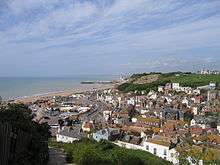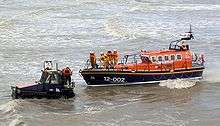Hastings Old Town

Hastings Old Town is an area in Hastings, England roughly corresponding to the extent of the town prior to the nineteenth century. It lies mainly within the eastern-most valley of the current town. The shingle beach known as The Stade (the old Saxon term meaning "landing place") is home to the biggest beach-launched fishing fleet in Britain. Many events take place every year in the old town such as the Hastings Old Town Week, Jack In The Green, the Seafood and Wine Festival, and the Bonfire Procession. Many of these events are centred on Winkle Island, which is, at the same time, the gathering place of the renowned Winkle Club.
Net Shops

The Net Shops are tall black wooden sheds which were built to provide a weather-proof store for the fishing gear made from natural materials to prevent them from rotting in wet weather. The sheds were originally built on posts to allow the sea to go underneath, however more shingle has built up and the sea no longer reaches the huts. The beach area on which the Sheds stand built up after groynes were erected in 1834, however the limited space meant the sheds had to grow upwards, even though some sheds do have cellars.
Local historian and author Steve Peak says about the net shops:
- The old town’s Net Shops - approximately 50 black wooden sheds standing in neat rows on a shingle beach are unique. They were built to provide weather-proof stores for fishing gear made of natural materials which rotted if wet for a long time. Today’s materials are artificial and can be left in the open. Most net shops stand on a piece of beach that appeared suddenly after the first of the town’s groynes were erected in 1834. The new beach area was small and close to the sea, so each shop could only have about eight or nine feet square to build on. But all boats had more nets than could be stored in such limited space, so the sheds had to grow upwards. Some have cellars. Many originally stood on posts to let the sea go underneath. Fishermen keep spare gear in the shops. One is a museum.
Churches
Two medieval Anglican churches—All Saints and St Clement's—and the former Ebenezer Particular Baptist Chapel of 1817 (now a house) are in the Old Town.[1] St Clement's was used as a filming location for the 2002 TV series Foyle's War.[2] The former St Nicholas' Church, an unparished mission chapel built in 1854 to serve the fishermen, was converted into the Hastings Fishermen's Museum in 1956.[3] Also, in the old town is the Grade II listed St Mary Star of the Sea Church.
Lifeboats

Hastings RNLI lifeboat station,[4] based in the Old Town, was established in 1858.[5] It currently operates a Mersey class offshore lifeboat, as well as a D class inshore rescue boat.[6] The offshore boat is launched from a carriage which is driven into the sea, and the boat is towed back up the beach on its return, by a caterpillar-tracked tractor, waterproofed so that it can operate almost completely submerged.
Buildings
-
The former Ebenezer Particular Baptist Chapel
-
Three of the Net Shops
References
- ↑ Nairn, Ian; Pevsner, Nikolaus (1965). The Buildings of England: Sussex. Harmondsworth: Penguin Books. pp. 519, 524. ISBN 0-14-071028-0.
- ↑ "IMDb". filming locations for Foyle's War. Retrieved 12 May 2011.
- ↑ Nairn, Ian; Pevsner, Nikolaus (1965). The Buildings of England: Sussex. Harmondsworth: Penguin Books. p. 520. ISBN 0-14-071028-0.
- ↑ "Lifeboat Station : Hastings". Royal National Lifeboat Institution. 2011. Retrieved 2 April 2011.
- ↑ "History". Hastings Life Boat. 2007. Retrieved 2 April 2011. External link in
|publisher=(help) - ↑ "Hastings Fleet". RNLI. 2011. Retrieved 2 April 2011.
External links
- Fishermen's Protection Society
- Fishermen's Museum
- Hastings Museums & Arts
- Nautical Heritage Association
- Royal National Lifeboat Institution
- Hastings Lifeboat